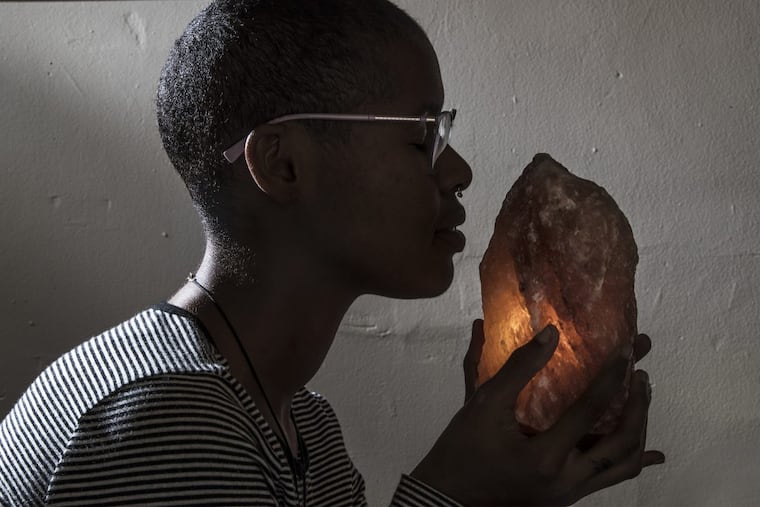Why are so many West Philly millennials looking to the stars?
Among West Philly millennials, it's become common not only to ask others' signs, but to ask their moon and rising qualities, as well.

At first, Kimani Keaton thought astrology was silly. When her girlfriend did her birth chart two years ago, Keaton found stuff that fit, stuff that didn't, and then went on happily ignoring the planetary forces.
But after graduating from college, the West Philadelphia nanny says, she found herself searching for more direction.
Keaton, a slim, 23-year-old with a shaved head and lavender horn-rimmed glasses, had a pattern of being in relationships for roughly six months, then moving on, repeating the cycle with someone else.
But with this new romantic interest, it was different — she knew she loved the woman.
So she went back to the natal chart, which she'd saved on her computer. She saw that her Mars is in Gemini, which told her she can be "scattered and unfocused." That landed. She'd hated herself for becoming bored with her lovers and leaving them, and that part of herself was charted so plainly. From that moment on, astrology has been the keystone to her spiritual life.
"Astrology helped me really find the words," she said. "It totally blew up my world."
She has lots of company among young people who look to the stars and heavens for direction and connection. The share of Americans who view astrology as empirical is rising, according to a 2014 National Science Foundation survey. In 2012, 42 percent of respondents said astrology was at least sort of scientific, a bracket that's grown by 11 percent since 2006. That was the case most prominently with young people. The share of 18- to 24-year-olds who could sense the science was 58 percent.
Skeptical scientists say astrology isn't evidence-based; astronomers point out that astrological systems have flawed understandings of outer space. Yet, the heavens are calling so many.
Sarah Pike, a New Age movements expert, said the astrology uptick arrives in a flow with several trends. Americans are not only becoming less churchgoing, they've also been "disaffiliating" certain practices from their deeply spiritual roots — think yoga. At the same time, Americans are experiencing an "emergence of personalizing spirituality," or cherry-picking their favorite aspects of multiple religions.
In Philly, this spiritual wave crests in the neighborhoods just west of the University of Pennsylvania that are a longtime locus of alternative culture.
Outside the Satellite Cafe on Baltimore Avenue last week, Jack Washburn, 23; Joey Degrado, 25; and Will Kennedy, 26; sat on the patio, cataloging what people in their circle are into: healthy eating, crystals, home-brewed kombucha — and celestial influences. In past decades, an icebreaker at a West Philly cafe might've been merely, "What's your sign?" Today, conversation orbits around moon signs (representative of the internal self) and rising signs (the personality one projects to others).
But that's just a starting point. Inside the coffeehouse, Cerise Townsend, 33, responded to a question about the local popularity of astrology by pointing to the planetary chart that was open on her laptop; as she has done for the last year, she was working on a weekly horoscope.
"I can't go to a party in West Philly without someone bringing it up," said Townsend. "And that [was the case] before me being an astrologer."
Today, anyone can plot his or her birth chart online, free, indicating a long list of planetary placements, each thought to provide insights into different facets of one's personality.
"You read three things, and you're like 'Yeah! Hell, yeah!" said Kennedy, a substitute music teacher. "It's fun to learn how to accept yourself through the lens of astrology."
Many locals who acknowledged devouring their birth charts also said they didn't necessarily believe in the zodiac. If a reader follows a horoscope's quick counsel, is that a question of faith? Not really, said Pike. With astrology, belief isn't as important as practice. "It's more about what you do, the patterns and rituals in how you order your day."
In West Philly, you see a spectrum of astrological engagement, from voracious horoscope readers to followers braiding their zodiac knowledge into occult worship. Astrology has gained a strong following among LGBTQ people, especially those of color.
Keaton says her parents weren't that religious but her grandparents were. (Her grandmother Maxine Ruth Keaton would take her to church on occasion.) "We'd show face on Easter and all that," she said, adding that her grandmother exposed her to common black church experiences. "It was also awkward when people would start fainting. [I'd wonder,] 'Can I eat food?' "
Today, she keeps a laminated portrait of her grandmother on her spiritual shrine, where it sits among healing crystals. She knows Grandmom Keaton would probably judge that but figures she'd understand, too.
Lauren McBride, the West Philly astrologer behind five-year-old Astro by Lauren, said analyzing personality — individually and in relationships — was a huge pull for clients. "Who doesn't like learning about themselves?" asked McBride, who also describes herself as a medium, though she doesn't do that professionally. "It's like taking a Buzzfeed quiz. People want to know what type of flower they are."
Keaton keeps the birth charts of loved ones and coworkers for reference. She checks her horoscope and astrological analysis nearly every two hours. If a planetary transit makes her feel stressed, she might pick up one of her healing crystals. When she reads something that truly resonates, she takes the time to journal it in her purple Moleskine. She understands those closest to her much better now, she said. Plus, she and her partner are still together. Astrology saved them again, she said, just last week.
"If the planets are changing, then I am changing," she said. "I need to know how to deal."